Break of Noon, Finborough Theatre review - irredeemable?

Prolix play woodenly acted; its own satire?
I’ve forgotten my wallet.

I’ve forgotten my wallet.

Across London last night politicians waited anxiously to hear their fates, and things were no different at the Vaudeville Theatre, where the ongoing Oscar Wilde season took a topical turn with An Ideal Husband.

Playwright Joe Penhall and the music biz? Well, they have history. When he was writing the book for Sunny Afternoon, his 2014 hit musical about the Kinks, he had a few run-ins with Ray Davies, the band’s lead singer.

Flo and Joan are sisters (Nicola and Rosie Dempsey: they have borrowed their stage names from their nan and her sister) and you may have recently seen them on television doing advertisements for Nationwide. Others may know them from social media, and their runaway hit “The 2016 Song” about music fans' annus horribilis with the deaths of David Bowie and Prince. If you like either iteration, you will love this hour-long show, called The Kindness of Stranglers.

Steven Soderbergh has always been capable of a big Hollywood moment – Magic Mike, Oceans etc. But much of his filmography consists of curious sideways glances. He’s particularly drawn to the shifting distribution of power between the genders. From sex, lies and videotape to Haywire, by way of Erin Brockovich and Out of Sight, he has rifled through the genres to find fresh and intriguing stories about men and women. It comes up again in Unsane, a sort of horror comedy satire that makes great use of Claire Foy’s vertical rise to bankability. It also, for the record, features a fun cameo from Soderbergh regular Matt Damon as an adviser of domestic security.
Foy plays Sawyer Valentini, whose very name suggests a split personality. She’s a single young woman who has moved from Boston to Pennsylvania to take up an office job and, seemingly, escape her nagging, needy mother. The new job is no panacea. The clients at the end of the phone test her patience and her boss is soon hitting on her. But deeper anxieties assail her. She hooks up with a hot guy on a dating app and, having promised him sex, thrusts him away in disgust.
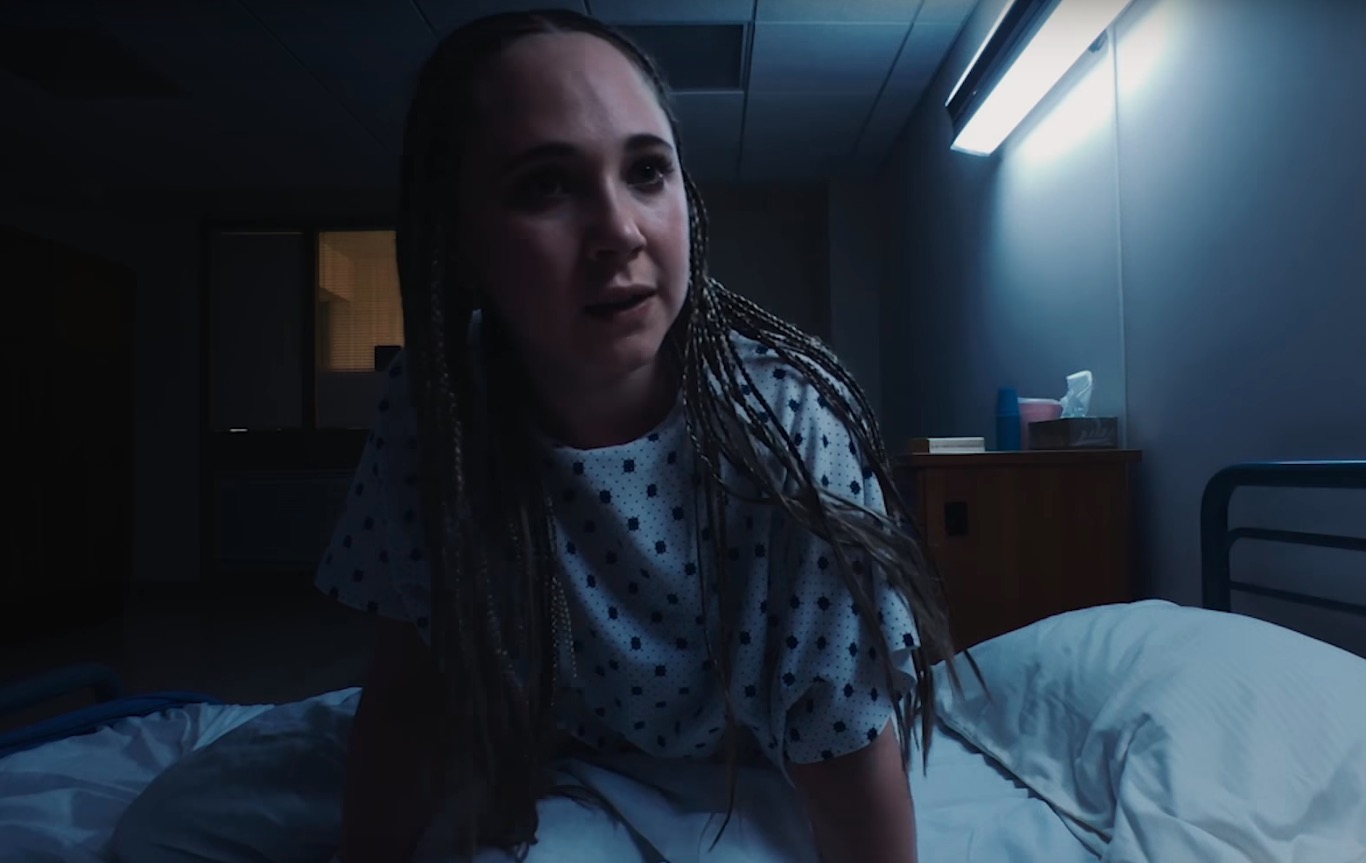 Distraught, one lunchbreak she drives over to a hospital to talk to someone about her history of being stalked which, she concedes, has brought on bouts of suicidal ideation. Barely is the session over before she has unwittingly signed a form consenting to her forced hospitalisation. When she objects, agggressively, the period of what feels like incarceration is extended from 24 hours to seven days. The creepily long and empty corridors and impassive white-coated staff inevitably evoke One Flew Over the Cuckoo’s Nest.
Distraught, one lunchbreak she drives over to a hospital to talk to someone about her history of being stalked which, she concedes, has brought on bouts of suicidal ideation. Barely is the session over before she has unwittingly signed a form consenting to her forced hospitalisation. When she objects, agggressively, the period of what feels like incarceration is extended from 24 hours to seven days. The creepily long and empty corridors and impassive white-coated staff inevitably evoke One Flew Over the Cuckoo’s Nest.
Sawyer's fellow patients would all seem to be as psychotic as Violet (Juno Temple, pictured above, very different from her wide-eyed turn in Woody Allen’s Wonder Wheel), who occupies the next-door bed. But she forms a bond with Nate (Jay Pharaoh), who counsels her to accept that everyone in Highland Creek Behavioral Center is being milked for their insurance money. When that runs out, they will be released. This would be reassuring if Sawyer hadn’t spotted her stalker from Boston wearing a nurse’s uniform and handing out the daily cups of medication. The nurse (Joshua Leonard, pictured below) insists he’s called George, not David Strine as she claims.
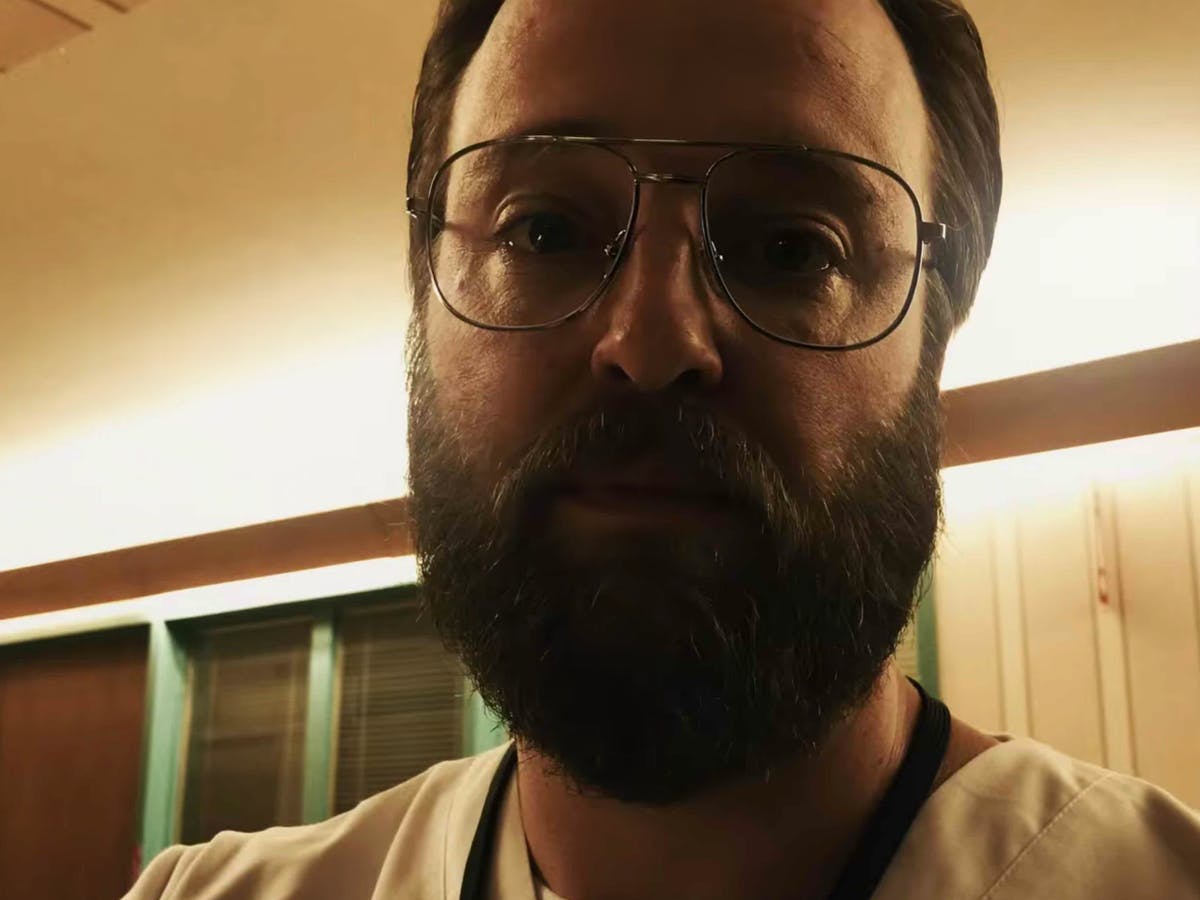 The script by Jonathan Bernstein and James Greer has no great truck with plausibility. How David/George could have landed this job and fetched up in Sawyer's life is not examined. The plot flirts with the idea that Strine is a figment of her imagination: is she hallucinating a beard, glasses and a lovelorn gaze onto every threatening male? But gradually scales fall from eyes as Sawyer is slipped her mind-bending medication, offering Soderbergh a chance to work up some woozy visuals (incredibly, he shot the whole thing on an iPhone). Then, after Sawyer summons her mother (Amy Irving) to rescue her, more disturbing things start to happen.
The script by Jonathan Bernstein and James Greer has no great truck with plausibility. How David/George could have landed this job and fetched up in Sawyer's life is not examined. The plot flirts with the idea that Strine is a figment of her imagination: is she hallucinating a beard, glasses and a lovelorn gaze onto every threatening male? But gradually scales fall from eyes as Sawyer is slipped her mind-bending medication, offering Soderbergh a chance to work up some woozy visuals (incredibly, he shot the whole thing on an iPhone). Then, after Sawyer summons her mother (Amy Irving) to rescue her, more disturbing things start to happen.
This is a robust breakaway for Foy, who has spent two years rei(g)ning it in as Her Majesty. She’s blonde, brittle and not altogether likeable here, and yet connoisseurs of her Queen Elizabeth will recognise her face’s powerful facility for exuding hurt and offence. She gets plenty of practice at that before the latter part of the film moves into new realms and calls for different colours. Unsane stops being a Kafkaesque satire of Big Pharma and the medical insurance racket, and mutates into a horror riff on the psychosis of delusional male sexuality. Perhaps insurers and stalkers are even cut from the same cloth. It’s all a bit bonkers, though nothing if not timely.
Overleaf: watch the trailer to Unsane

The Bulgarian co-directing duo of Kristina Grozeva and Petar Valchanov proved their skill with the scalpel in slicing through the unforgiving world depicted in their first film, The Lesson, from 2014. Their follow-up in a loosely planned trilogy, Glory continues that dissection of Bulgarian society, one now depicted on a broader canvas and with an element of pitch-black comedy that is new.
It’s a darkly entertaining watch, which involves direct comparison between two very different worlds – one that appears virtually unaffected by the social changes that followed the end of communism, the other infected with a cynicism that is very much a product of the new order that followed. Grozeva and Valchanov’s story has a pronounced simplicity that gives the film an aspect of parable.
Tsanko is treated more as an object than as a human being
Their main character, Tsanko (Stefan Denolyubov), represents the uncorrupted old order, his thick beard and generally unkempt look making clear that he’s not concerned with appearances. He works as a linesman on the railways somewhere out in the provinces, checking the track. Something of a loner – he has a severe stammer – he’s engaged with his own private world, which revolves around domestic tasks, and keeping the exact time, something essential for his work. When one day he finds a stash of cash on the railway line, his innate honesty means he doesn’t hesitate – though he lives a very basic life indeed – to turn it in to the police. It’s a deed that sees him labelled, given the corruption of his surrounding world, a “fool of the nation”.
But it draws the attention of his bosses at the Ministry of Transport off in Sofia, for whom such a selfless gesture comes as a welcome corrective against wider corruption allegations being bandied around about the high-ups. Arch Ministry PR boss Julia Staykova (Margita Gosheva, pictured below) arranges an award ceremony that sees Tsanko brought to the capital – he’s treated throughout more as an object than as a human being – to be paraded to the press. When her distracted forgetfulness means that Tsanko loses the family watch which is a crucial part of his identity (it’s a Russian-made Slava, or "Glory" in English, historic brand), a whole destructive chain of events is set in motion, and her thoughtless (but unwitting) mistake brings drastic consequences for all.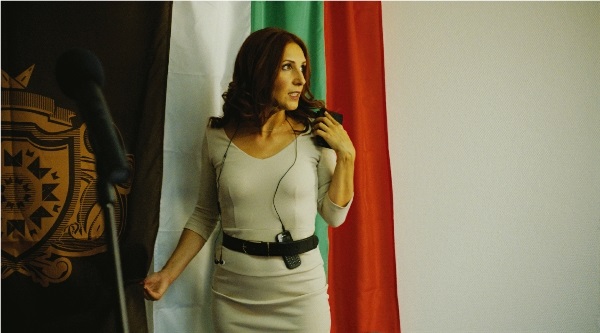 The unlucky hand of fate is a familiar element in the cinema of Eastern Europe – “inexorable” seems to be one of its recurring words – and it assumes an extra tragic element here, given the extreme innocence and naivety of one party in the story. Tsanko becomes something of a holy fool, his stammer making him excruciatingly unsuited for the cynical PR world to which he is exposed: when we witness the thoughtless laughter that he provokes there, real cruelty hits home. The directors are equally unsparing in their depiction of their heroine, however: Julia’s work concerns are played out incongruously against the background of her attempts to conceive a child through IVF, with each clinic appointment perpetually interrupted by calls on her mobile. The directors don’t need to labour their point, that she has lost track of the important things in her life: the closing chaos in which she finds herself brings that home. Even so, the darkness of the film’s implied conclusion endorses a markedly bleaker view of the world than anything that has come before.
The unlucky hand of fate is a familiar element in the cinema of Eastern Europe – “inexorable” seems to be one of its recurring words – and it assumes an extra tragic element here, given the extreme innocence and naivety of one party in the story. Tsanko becomes something of a holy fool, his stammer making him excruciatingly unsuited for the cynical PR world to which he is exposed: when we witness the thoughtless laughter that he provokes there, real cruelty hits home. The directors are equally unsparing in their depiction of their heroine, however: Julia’s work concerns are played out incongruously against the background of her attempts to conceive a child through IVF, with each clinic appointment perpetually interrupted by calls on her mobile. The directors don’t need to labour their point, that she has lost track of the important things in her life: the closing chaos in which she finds herself brings that home. Even so, the darkness of the film’s implied conclusion endorses a markedly bleaker view of the world than anything that has come before.
The satire of Glory is certainly impressive: it’s the very fluency of some of its comedy that gives rise to a more profound feeling that something is very wrong in this story told in microcosm from a wider national narrative. The gradual process of adaptation to drastic change in society is bound to be slow, and we can only hope that Grozeva and Valchanov will be around to chart it for a long time to come. The Lesson proved that they could make powerful drama out of everyday events. Glory reunites them with both that film's main cast and technical collaborators – DP work, playing heavily with handheld style, from Krum Rodriguez looks as accomplished as ever, while Margita Gosheva as Julia simply carries all before her – from their first film, but has stretched both their perspective and repertoire. Their style certainly veers towards the understated, but its power grows incrementally, and most importantly it compels an element of human involvement from us as viewers.
Overleaf: watch the trailer for Glory

One of the oldest pleasures of cinema is the opportunity it gives us to look at beautiful people in beautiful places, possibly having beautiful sex. Often audiences get exactly what they came for but sometimes it isn’t exactly straightforward. Take The Square, the Oscar-nominated film from Swedish director Ruben Östlund that won the Palme d'Or at Cannes last year. Its cast includes Danish heart-throb Claes Bang (tipped as a potential James Bond), handsome Dominic West (of Wire fame) and lovely Elizabeth Moss (freed from her Handmaid’s Tale wimple). The setting is Stockholm’s fashionable art world so there’s a visual feast of ultra-cool art gallery interiors, gilded halls, luxury apartments, modernist offices and a Tesla slicing through streets familiar from all those Scandi noir series.
This isn’t a thriller, although it is certainly filled with jeopardy, and it isn’t a romance, although it has one of the most startling sex scenes I’ve seen since Toni Erdmann. Instead The Square is a post-modern farce – a string of terrible mishaps befalls museum director Christian (Claes Bang, pictured below) as he tries to hype a new exhibit and we watch his life spiral from cool to chaos. It’s also a satire, gleefully poking fun at the pretensions of the art world and liberal Swedes’ earnest efforts to promote a dialogue on immigration and racism.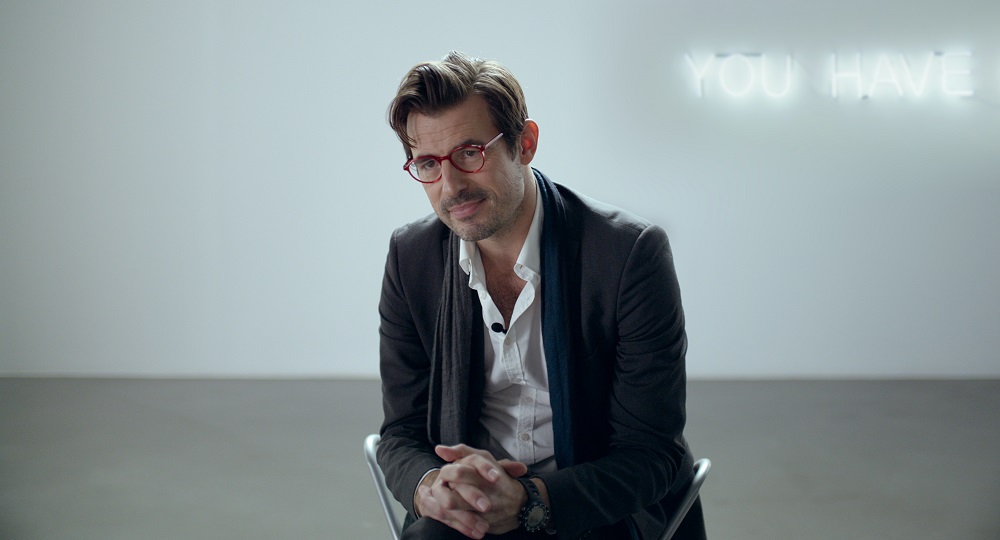 But most of all, The Square is brilliantly acted and very stylish, if at times just a little bit too pleased with how clever it is. To describe the plot in any detail would be to spoil the film’s unfolding pleasures; suffice to say there is a theft, inept revenge, social and professional humiliation, and an actor impersonating an ape who should make Andy Serkis a tad jealous.
But most of all, The Square is brilliantly acted and very stylish, if at times just a little bit too pleased with how clever it is. To describe the plot in any detail would be to spoil the film’s unfolding pleasures; suffice to say there is a theft, inept revenge, social and professional humiliation, and an actor impersonating an ape who should make Andy Serkis a tad jealous.
Östlund is following up his disquieting hit Force Majeure and his budget has increased exponentially. For the first time he’s working with actors famous outside Scandinavia. But his directing style hasn’t changed – gruelling improvisations and multiple takes until the performance is just as he wants. Director of photography Frederik Wenzel's elegant shots are held at almost uncomfortable length; the audience is given plenty of time to observe closely each character as their thoughts and feelings flicker in front of our eyes.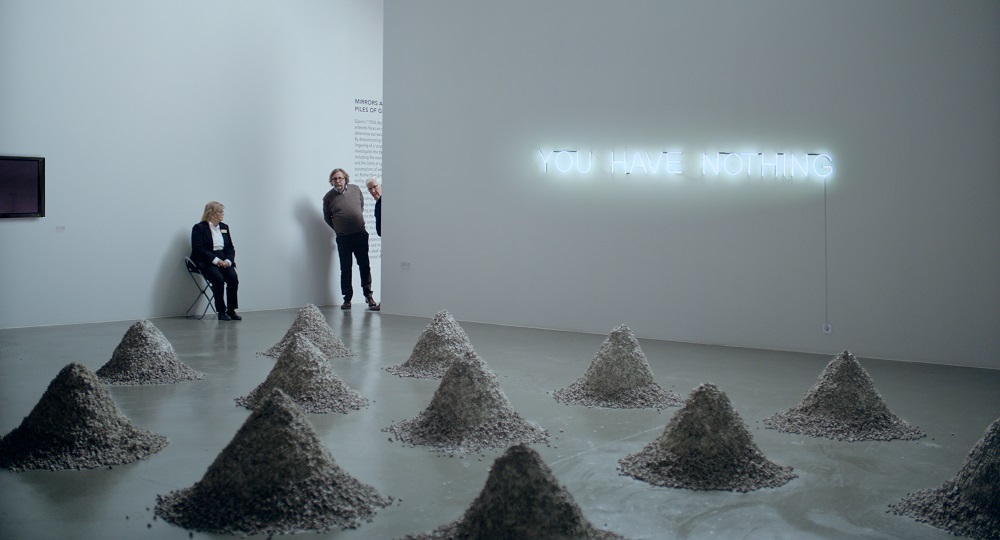 There’s much clever framing too, marginal figures edging into our vision. The spaces Christian navigates are both claustrophobic and hallucinatory. Confusing, faintly disturbing peripheral sounds come from off-screen with no explanatory cut-aways to their source. Dialogue is kept naturalistic and doesn't get in the way of the actors – Aaron Sorkin does not haunt this script.
There’s much clever framing too, marginal figures edging into our vision. The spaces Christian navigates are both claustrophobic and hallucinatory. Confusing, faintly disturbing peripheral sounds come from off-screen with no explanatory cut-aways to their source. Dialogue is kept naturalistic and doesn't get in the way of the actors – Aaron Sorkin does not haunt this script.
The noodling a cappella score is a touch irritating in its over-signalling of wit and the child actors lack credibility, but The Square finds Östlund at the top of his game. It should provide the most fun to be had in an art movie this month if not an art gallery (installation pictured above). And Claes Bang's English accent, a homage to David Bowie, is startlingly good. This Danish actor would have no problem squaring up to Bond.
Overleaf: watch the trailer for The Square

The American family has seldom looked more desperate. Will Eno’s The Open House depicts a gathering of such dismal awfulness that it surely sets precedents for this staple element of American drama.

Alexander Payne’s best-loved film is Sideways but that title may as well work for everything and anything in his oeuvre. In Election, About Schmidt, The Descendants and Nebraska, he puts America and Americans under the microscope from a variety of quizzically oblique angles. There’s another tilt shift in his latest satire.